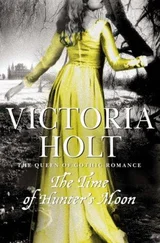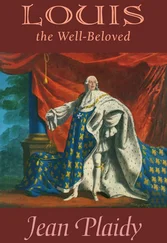He and I had always been good friends. I had not shone at the subjects he had taught but living under the same roof with him for so long I regarded him as a kind of brother. I sometimes wondered though if I had never seen Tybalt I might have been reconciled to the idea of marrying him and going on in the rectory which had been my home all my life —for it was a foregone conclusion that when the Reverend James retired or died, Oliver would come into the living.
I could not talk to anyone of my feelings for Tybalt. They were absurd anyway, for surely it was ridiculous to feel this intense passion for someone who was hardly aware of one's existence.
But our relationship did undergo a change and he began to be a little aware of me. Tabitha Grey was very kindly and she noticed how despondent I was when Evan Callum ceased to teach us. As I grew older she seemed to grow younger. I suppose at fourteen anyone of twenty-four seems very old; but when one is nearly eighteen, twenty-eight seemed younger than twenty-four did at fourteen. Tabitha was Mrs. Grey so she had been married. Ever to have called her Grey Tabby was incongruous. She was tall with rippling dark hair and large light brown eyes; when she played the piano her expression changed, something ethereal touched it and she was then undoubtedly beautiful. She was gentle-natured, by no means communicative; sometimes I thought there was a haunting sadness in her face.
I had tried to find out from Sabina what exactly her position was in the household.
"Oh, she just manages everything," said Sabina. "She's there for me when my father and Tybalt are away; and she looks after the servants—and Nanny Tester too, though Nanny won't admit it. She knows quite a lot about Father's work. He talks to her about it—so does Tybalt."
I was more interested than ever and that gave us something in common. I had one or two talks with her after our music lesson. She became quite animated discussing Sir Edward's work. She told me that on one occasion she had been a member of his party when they had gone down to Kent working on some Roman excavation.
"When Sabina is married I shall go again," she said. "It's a pity that you're a girl. If you had been a boy you might have taken archaeology up as a profession."
"I don't think we have the money for that at the rectory. I was lucky they tell me to get the sort of education I have. I shall have to earn some money. What I shall do, I don't know . . . except that I shall probably have to be a governess."
"You never know what's waiting for you," she said. Then she lent me some books. "There's no reason why you shouldn't go on reading and learning all you can."
It was when I went to Giza House one late afternoon to return some books that I heard music. I guessed Tabitha was playing and glancing through the window into the drawing room I saw her seated at the piano and Tybalt was with her; they were playing a duet. As I watched the duet ended; they turned to each other and smiled. I thought then: How I wish he would smile at me like that.
As people do they seemed to guess that they were being watched and both of them looked simultaneously towards the window and saw me.
I felt rather ashamed for being caught looking in but Tabitha waved that aside.
"Come in, Judith," she said. "Oh, you've brought the books back. I've been lending these to Judith, Tybalt. She's very interested."
Tybalt looked at the books and his eyes lit up quite warmly.
"What did you think of them?"
"I was fascinated."
"We must find some more for her, Tabitha."
"That was what I was going to do."
We went into the drawing room and we talked . . . how we talked! I had not felt so alive since Evan Callum had left.
Tybalt walked back to the rectory with me, carrying the books; and he went on talking too, telling me of the adventures he had had; and how excited he had been when he had found certain things.
I listened avidly.
At the door of the rectory he said: "You really are very interested, aren't you?"
"Yes," I answered earnestly.
"Of course I always knew that you were interested in mummies."
We laughed. He said goodbye and that we must have another chat. "In the meantime," he said, "go on reading. I'm going to tell Tabitha what books to give you."
"Oh, thank you!" I said earnestly.
Dorcas must have seen us from one of the windows.
"Wasn't that Tybalt Travers?" she said as I started to ascend the stairs.
I said it was; and because she waited for some explanation I went on: "I took some books back to Giza and he walked back with me."
"Oh!" was all she said.
The very next day she mentioned him again. "I've heard that they're expecting a match between Tybalt Travers and Theodosia."
I felt sick. I hope I didn't show it.
"Well," went on Dorcas cautiously, "it's to be expected. The Traverses and the Bodreans have been friends for years. I'm sure Sir Ralph would like to see the families united."
No, I thought. Never. Silly little Theodosia! It wasn't possible.
But of course I knew that it was highly probable.
Oliver Shrimpton had an opportunity of a living in Dorset. Dorcas and Alison were very upset.
"What we shall do without you, Oliver, I can't imagine," said Alison.
"You've been wonderful," Dorcas told him.
He went to see the Bishop, and I have never seen Dorcas and Alison quite so happy as they were when he came back.
I was in my room reading when they came in. "He's refused it," they said.
I said, "Who?"
"Oliver."
"But what has he refused?"
"I don't believe you're listening."
"It takes a little time to tear oneself away from the ancient Egypt to the rectory of St. Erno's."
"You get too deep into those books. I don't think it's good for you. But Oliver has been to see the Bishop and refused the living. He has explained that he wishes to stay here, and the understanding is that when Father retires he will become rector here."
"That's wonderful news," I said. "Now we shan't have to worry about losing him."
"He must be very fond of us," said Dorcas, "to do so much for us."
"Fond of some of us," said Alison significantly.
Evan Callum came down to stay at Giza House with the Traverses. I believe he was invited quite often to Keverall Court.
He called at the rectory to see me and we had a very interesting talk. He told me I had been his most promising pupil and it was a great shame that I had not been able to take up the subject in earnest.
Miss Graham found another post and left; and then lessons were over. It was quite clear that I was never going to be a musician; but I didn't need that excuse now to go to Giza House. I could go into the library there and select books and if they were not some of Sir Edward's precious ones, I could take them home.
I saw very little of Theodosia now. There were many parties at Keverall Court to which naturally I was not invited; and there was entertaining at Giza too which was quite different—although Tybalt and his father often went to Keverall and Sir Ralph and Lady Bodrean visited Giza —but I gathered from Tabitha that there were dinner parties when the conversation sparkled and of course it centered round the work of those guests—this fascinating absorption with the past.
Life was quite changed for me. I did some of the parish visiting with Dorcas and Alison. I took flowers from the garden to the sick; I read to those whose eyesight was failing; I took food to the bedridden and went off to the town to shop for them in the little trap we called the jingle —a two-wheeled vehicle drawn by our own Jorrocks, who was something between a horse and a pony.
I was settling down to becoming the typical rectory daughter. That Christmas Oliver and I brought in the yule log and I made the Christmas bush with Alison and Dorcas.
Читать дальше










